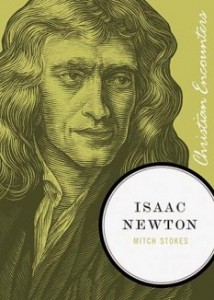“The glory of God is to conceal a matter, the glory of kings is to search it out”  (Proverbs 25:2). Such was the “glory” of early scientists like Isaac Newton. Unlike the rampant secularism of today’s scientific community, Newton and his peers were driven by devotion to God, often doubling as theologians. On occasion, Newton’s “devotion” to both God and science took alarming form.
(Proverbs 25:2). Such was the “glory” of early scientists like Isaac Newton. Unlike the rampant secularism of today’s scientific community, Newton and his peers were driven by devotion to God, often doubling as theologians. On occasion, Newton’s “devotion” to both God and science took alarming form.
Once, as an experiment, Newton stared at the image of the sun reflected in a mirror. The brightness seared his retina, causing temporary blindness. Only after he hid for three days in a darkened room did his sight return. Talk about devotion to his craft! And as an expert alchemist, Newton often handled deadly elements. In fact, it is commonly believed that Isaac Newton died from lethal amounts of mercury.
These are a few of the fascinating details of one of history’s greatest scientists as revealed in Mitch Stokes’ biography, Isaac Newton. It’s part of a promising new series by Thomas Nelson publishers entitled Christian Encounters. If the rest of the books are as informative and easy to read as this one — and with biographies slated for such diverse figures as Bach, William Buckley, St. Francis, and Tolkien — there should be something for everyone. (Plus I loved the nifty size and fold-out jacket panels!)
Undoubtedly, Newton is not everyone’s cup of tea. As an astronomer, physicist and philosopher, the topics that (literally) consumed Newton’s life can be dense. Yet Stokes balances discussions of gravitational theory and Aristotelian philosophy with more personal elements from the scientist’s life, such as his perpetual squabble with peers, fiercely guarded privacy, anti-Trinitarian views, and his virginity. So it’s not a dry read. I found the book illuminative as regards today’s scientific culture, particularly Newton’s profession of an “intelligent Agent” behind the laws of the Universe. He wrote:
This most elegant system of the sun, planets, and comets could not have arisen without the design and dominion of an intelligent and powerful being.
In a world that embraces Isaac Newton and his gravitational theory as foundational to modern science and physics, it’s a shame that The Foundation of his science has been discarded by today’s intellectual and scientific elite. Anyway, I really enjoyed this biography and think TN’s Christian Encounters series holds a lot of promise.















I've wanted to read some of Newton's non-scientific writings as well as some of the other early Christian scientists, like Pascal and Descartes. The small but intense anti-intellect streak that kind of floats around the church could use a good antidote, I think.
I linked your excellent de Compose -blog to my blog dealing with emotions. It is based on SDG Chart of emotions (http://www.taiwas.net/emotions) , which is a creation to give glory only to God. I think that it is made with an attitude of early Christian scientists like Newton. It also includes Dr James Engel´s chart as ingredient. Please visit.